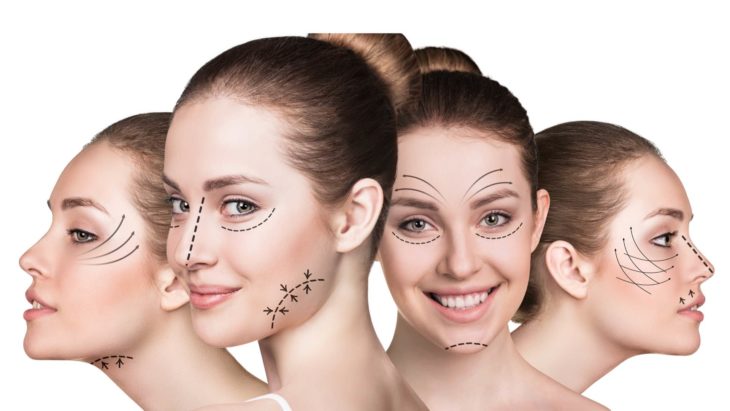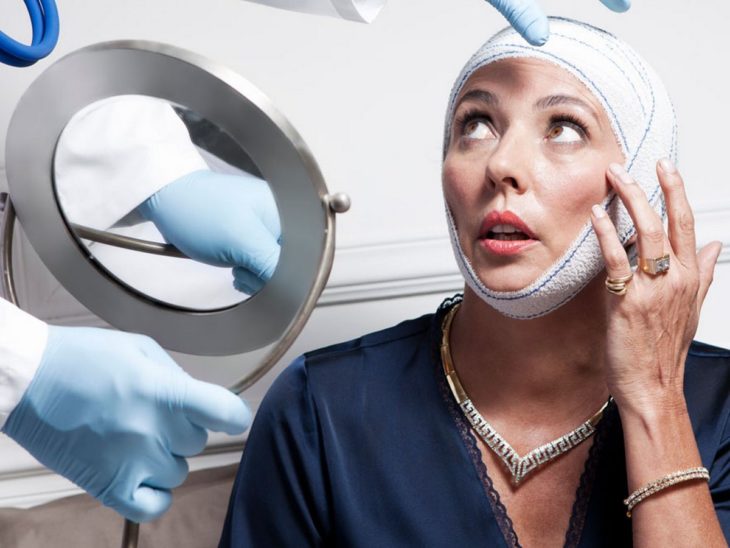You know that moment, where you’re gripping some of your side fat in the bath, and you just ate all of the leftover spaghetti at once, with pesto and tomato sauce and grated cheese and, weirdly, liverwurst, and you’re thinking, Tomorrow I will go to the gym. And then I’ll go every day after that, for the rest of my life. And I will lose weight. It’ll be easier than I expect it to. And then my hair will grow out and it’ll be thicker than last time. And then I’ll be prettier. And then I’ll wear sleeveless dresses all the time and I’ll be happy?
That moment is lying to you.
I don’t know when I learned it, but somewhere along the way to twenty-six, I had very deeply, very seriously internalized the idea that after I got prettier, things would be better.

Source: medassist
You have to think that way, to get cosmetic surgery.
You have to really, really believe that you will come out of it a new, better you. A you that can face the world with a better face, which will make the world infinitely more faceable.
Sometimes it’s true. Sometimes you end up more confident. Sometimes you end up smiling more.
A lot of the time, though, it’s a big, cruel, manipulative lie.
Before I changed my face, I had big plans for after. I was going to wear things I’d not been confident enough for before. I was going to stand up straighter, finally. I was going to be better at making friends with strangers. I would probably be able to carry on a witty conversation while grocery shopping, and I wouldn’t forget the eggs, and I would laugh rivetingly, with my head thrown back. I was going to be more thorough in my enjoyment. I would feel corrected, ready, persistently better.
When the hilarious nose cast (that even my brother felt too sorry for me to make fun of) came off and the bruises faded enough, I took my nose for a walk in town. I was wearing a little dress, and I stood up straighter, and I walked with purpose into my new life with my new face.
“It’s working,” I told my friend later that day. “It’s totally working. People look at me differently now. I can tell they think I’m prettier.”
She shrugged willingly. “Maybe they do. But you don’t look that different.”
“No, it’s the subtle changes. People can pick up on them. We’re very sensitive to proportions.”

Source: cosmeticsurgeryofnwi.com
She shrugged again. “I guess we are.”
I sighed. How little she understood about the world.
I believed absolutely in the subtle variation argument. After all, I drew and painted faces all the time. I knew how the spacing of the eyes was a matter of measurements well under an inch. The length and width of the nose, either prominent or gentle, depended on fractional differences. Features are delicate and slight alterations can transform their fragile interplay. You know, from, like, me, for instance, into, say, Gisele Bundchen (whose own post-op nose I awkwardly showed my surgeon, when he asked for examples of what I wanted mine to look like).
But the truth was, I didn’t look that different. After a while it became clear that my nose had not so much been improved, but rather slightly rearranged. The bump had traveled down a little, and now it was faintly crooked.
Even my surgeon agreed. “I’m sorry,” he said. “I’ve only gotten it wrong one other time.” He explained that he’d had this long, important career. That my face was one of only two major mistakes he’d ever made. He offered me the second surgery for free. A gentleman.
I had been so sure that everything was different. That I had crossed this magical line into beauty, and there would be a welcoming party of enthusiastically appreciative, yet comfortably respectful young men, and poised, confident, mildly jealous young women waiting to greet me. The whole world would turn, catch a glimpse of me, and stay there for an extra second, smiling, dazed, glad of my existence.
I had been so sure, that I saw it happening.
Maybe it happens more than I think when I let myself look for it.

Source: mirror
When it turned out that I was wrong, I slid slowly back into seeing people as unaffected by me, as unimpressed. I went back to see my face as a work-in-progress, poorly expressed, in need of refinement, unfortunate and impeding. It was like I was tripping over my own face. And I’m not even flexible.
That was years ago. These days, I find I have less of a need for the whole world to check me out. Thank god. It’s taking a long time for that impulse to die its soap-opera death.
But I still do that thing. It’s not always about my face now. Often, it’s my belly instead. Or my arms, of course. Once you lose enough weight that it finally comes off your arms, which will take a while because arm fat, according to that time you overheard your uncle talking about it, is the worst and most determined kind of fat and you don’t lose it until you’re starving, basically—so once you have starved yourself to the point of losing the goddamn arm fat, then you will put that dress on, and you will look amazing! Well, not amazing, let’s not get ahead of ourselves here, your legs will always be too short. But better! So much better! And then you will be more confident, and you will write the next chapter of your book like it’s no thang at all and you will be clever all the time, even in the elevator, instead of pretending to read things on your phone and wondering if you are standing funny. You will be loved by all. You will be so much happier.
But actually, no.
Because no one is ever pretty enough when they think that way. There is always something left to do. To improve. To tweak. To work on. To fix.

Source: plasticsurgerypractice
Because sometimes it’s all just an excuse not to be happy right now. Not to have to figure out why we should be happy right now. Not to have to deal with the reality of happiness. It’s not a thing you get to, like a pot of gold hidden by ancient aliens at the top of Mount Everest and only the strongest, sturdiest climbers aided by the best Sherpas (who still won’t get any credit) will ever reach. It’s a thing you have to find inside of yourself, even when you’re at the Walmart at the bottom, just trying to find a pair of underwear that is a low-rise bikini in a plain color, damnit, why is that too much to ask?
Happiness is a thing that doesn’t actually have a whole lot to do with how pretty you are or could, potentially, with a lot of willpower and special expensive makeup, become.
So stop waiting for yourself to change.
Or at least know that, even if you do change, it’ll still be your brain in there. And somewhere along the line, there will be something else about the way you look that you keep tripping over.
So you might as well learn how to stand up straight now, and stop tripping, and notice when people appreciate you, and get in the bath and just lie there, letting the water soak into your side fat. It feels good, doesn’t it? Especially after all that spaghetti.
Original by
